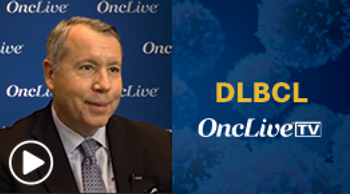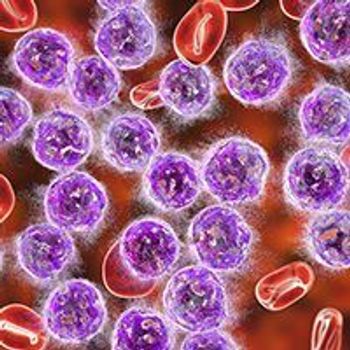
An expert panel shares perspectives on how to choose the appropriate patients with non-small cell lung cancer for lung resection.

Your AI-Trained Oncology Knowledge Connection!


An expert panel shares perspectives on how to choose the appropriate patients with non-small cell lung cancer for lung resection.

Michael Maris, MD, discusses key efficacy and safety data from the phase 2 OUTREACH trial in diffuse large B-cell lymphoma.

A panel of distinguished experts discuss how detection of actionable mutations affect their treatment choices in non-small cell lung cancer.

David Spigel, MD, and David H. Harpole Jr, MD, describe when adjuvant therapy is recommended in early stage NSCLC and discuss data from recent clinical trials of adjuvant therapy.

Ian Flinn, MD, PhD, discusses the significance of the FDA approval of zanubrutinib in chronic lymphocytic leukemia and small lymphocytic lymphoma.

Andrew McKenzie, PhD, discusses biomarkers to test for in breast and lung cancers, the value of multicancer early detection, and how biomarker testing can better direct targeted treatment across solid tumors.

Dr Johnson discusses the FDA approval of tremelimumab plus durvalumab and chemotherapy in non–small cell lung cancer, key data from the POSEIDON trial, and the combination’s efficacy and tolerability in various patient populations.

Jesus G. Berdeja, MD, discusses the investigation of BMS-986393 in patients with relapsed/refractory multiple myeloma.

Melissa L. Johnson, MD, shares key insights from the meeting, including pertinent findings in KRAS G12C¬–mutated NSCLC from the phase 3 CodeBreak 200 study and positive findings with atezolizumab in platinum-ineligible patients with NSCLC.

Melissa L. Johnson, MD, discusses the paradigm-shifting results of the phase 3 IPSOS trial of atezolizumab in patients with metastatic non–small cell lung cancer.

Andrew McKenzie, PhD, discusses the variety of molecular testing modalities in patients with metastatic non–small cell lung cancer.

Melissa L. Johnson, MD, expands on the updated data from the POSEIDEN trial, the rationale for investigating the combination, and what these results mean for the treatment of metastatic non–small cell lung cancer.

Melissa L. Johnson, MD, discusses the evolution of frontline treatment in non–small cell lung cancer.

Ribociclib plus endocrine therapy elicited statistically significant progression-free survival and overall survival benefits vs placebo plus endocrine therapy in patients with hormone receptor–positive/HER2-negative advanced breast cancer with visceral metastases, including those with liver metastases and multiple metastatic sites.

The frontline combination of tremelimumab plus durvalumab and chemotherapy generated a long-term overall survival benefit in patients with metastatic non–small cell lung cancer.

Erika P. Hamilton, MD, discusses testing used to identify patients with HER2-positive and HER2-low breast cancer.

Erika P. Hamilton, MD, shares how multidisciplinary collaboration between pathologist and breast oncologists is key to staying abreast of not only the classification-actionable HER2 mutations in metastatic breast cancer but also the evolving definition of expression.

Benjamin Garmezy, MD, discussed the positive trajectory of antibody-drug conjugates and immunotherapy in urothelial carcinoma, highlighting the importance of considering individual patient eligibility for treatments like first-line chemotherapy.

HPN328, a novel half-life extended DLL3-targeting T-cell engager, demonstrated clinical activity and tolerability in patients with pretreated small cell lung cancer and other neuroendocrine tumors, according to findings from a phase 1/2 study (NCT04471727).

Erika P. Hamilton, MD, discusses the updated analysis of the phase 3 EMERALD trial in estrogen receptor–positive, HER2-negative breast cancer.

Updated data from a safety analysis of the phase 3 DESTINY-Breast03 study confirmed the tolerability of trastuzumab deruxtecan among patients with with HER2-positive unresectable or metastatic breast cancer.

The addition of nivolumab to trastuzumab deruxtecan did not result in a marked clinical benefit in patients with locally advanced unresectable or metastatic HER2-positive breast cancer.

The novel allogeneic CAR-engineered natural killer cell therapies, NKX101 and NKX01, showcased early signs of safety and efficacy when utilized in the treatment of heavily pretreated patients with acute myeloid leukemia and non-Hodgkin lymphoma.

David Spigel, MD, discusses potential upcoming developments in targeted therapies for non–small cell lung cancer.

Investigators hope to address the need for additional treatment options for patients with class II or class III BRAF-altered disease with KIN-2787, a next-generation, orally available, potent, and selective small molecule inhibitor.

The survival rate for Americans diagnosed with several of the most common cancers has increased dramatically in the past nearly three decades, thanks in large part to scientific discoveries and treatment advances.

Meredith McKean, MD, MPH, discusses the importance of molecular profiling in melanoma.

Meredith McKean, MD, MPH, discusses how the presence of atypical BRAF mutations affects treatment selection in patients with metastatic melanoma, highlighted the ongoing KN-8701 trial, and explained why developments in this space further solidify the importance of broad molecular profiling.

David Spigel, MD, discussed the focus of each presentation, which centered on immunotherapy vs chemoimmunotherapy in the frontline metastatic setting, the surgical perspective of treatment in early-stage NSCLC, best practices for molecular testing, and EGFR- and KRAS-targeted therapies for patients with advanced disease.

One of the reverberating themes of 2021 that should carry into 2022 is the importance of molecular testing.